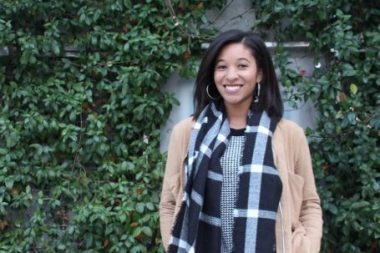A strategic communications major explores the acceptance of natural hair among black female college students.
CELEBRATE! Week offers an annual opportunity to highlight the academic and artisitic achievements of Elon students and faculty. Each day this week, we’ll be putting the spotlight on a student scholar’s research — what they are seeking to find out, and how they became interested in their project.

Major: Strategic Communications
Minor: Business Administration
Faculty mentor: Vanessa Bravo, assistant professor of communications
Title of research: The Natural Hair Journey: Social Media Communities on YouTube and the Promotion of Natural Hair Acceptance Among Black, Female College Students
Abstract:
A second wave of the natural hair movement is emerging among young, black women. This movement is a rejection of the European ideal of beauty and promotes acceptance of afro-textured/kinky coily hair, which has historically been viewed as unkempt and unprofessional.
Due to inexperience with caring for their natural hair texture and judgment from older generations, many young black women are turning to social media platforms to gain information and support, and to become a part of a larger community that embraces the natural hair movement with pride. YouTube, in particular, is a platform that is allowing content creators and consumers to redefine the cultural understanding of natural hair.
Using framing theory as its theoretical framework, this study analyzed YouTube content (10 videos and 241 users comments) to identify the most salient themes that are being disseminated online about the natural hair journey. Intercoder reliability was measured for coding using Holsti’s coefficient. Once the themes were identified, described and analyzed through a qualitative content analysis, they were used to further explore the topic through in-depth interviews with 17 black, college-age women.
These women were asked to articulate their experiences of wearing natural hair and describe how social media may or may not have influenced this experience. Preliminary findings suggest that YouTube videos helps to promote overwhelmingly positive narratives,which is reflected in the self-confidence and sense of freedom that women describe after going natural. YouTube comments and interview findings reveal that the video content aids women in overcoming challenges during their natural hair journeys, such as facing societal judgment and going against familial norms.
However, the interview findings also reveal concerns surrounding the accuracy of depictions on social media platforms as it relates to colorism and hair texture and the influence of branded content. This study discusses the implications of the natural hair movement on the establishment of a strong Black identity, as well as the transformative social impact of online communities.
In other words:
This study is examining the discourse taking place on social media about the natural hair movement and the journey that black women go through when choosing to embrace their natural hair. This online community is a space that provides educational and emotional support.
Explanation of study:
This study explores “parasocial” relationships that take place between content creators and viewers through YouTube content. A content analysis was completed to find the most salient themes within ten YouTube videos about the natural hair journey and 241 corresponding comments. The study then delves further into these themes by including 17 in-depth interviews with black, college-aged women who speak candidly about their experiences with going natural and using YouTube as a source.
What made this research interesting to you? How did you get started?
One of the main reasons that I was interested in even majoring in communications is because I have always been interested in the way that women of color are represented in the media. I believe that the quality and quantity of representation of this group needs to improve.
Social media interests me so much because it is now a platform that allows various groups to increase representation of themselves by producing content and shedding light on topics that are culturally important to them. Natural hair is one of those culturally important topics for black women that I thought would be very interesting to explore in an academic setting.


